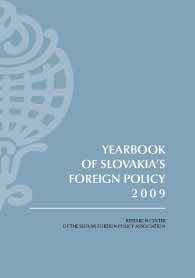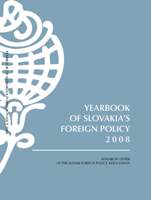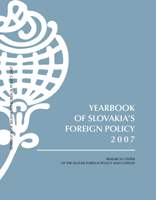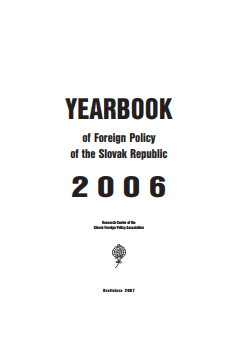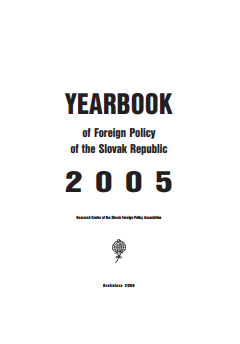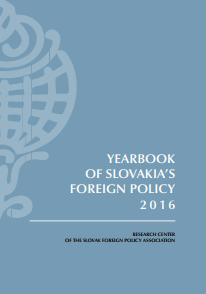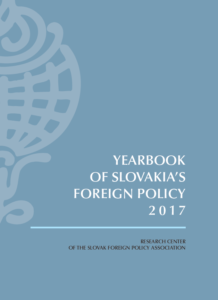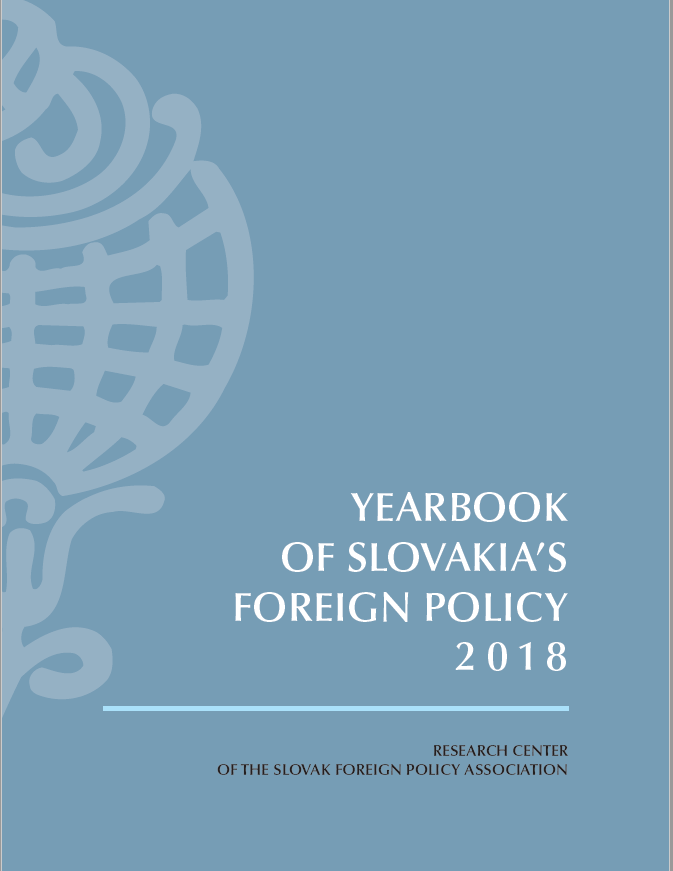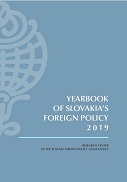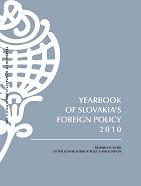
Yearbook of Slovakia's Foreign Policy 2010
Yearbook of Slovakia's Foreign Policy 2010
Keywords: 2010; Slovakia; Hungary; EU development; EU; economy; international relations; foreign policy; diplomacy; security; defense; NATO; Western Balkans; governance; Visegrad; Milan Rastislav Štefánik;
This is only for the second time in the history of this edition, that the Yearbook assesses a year which saw a complete political power shift and thus an exchange of those who make and decide on foreign policy. It was an election year, a year of foreign policy accent shift, and a year of institutional and personnel changes (not only) at the Foreign Ministry. For the first time, the leader of the strongest coalition party became the Foreign Minister; a person with the real political power to move our foreign policy (and not only in the institutional or financial sense) a step (leap) forward. One can only hope that the current Government will also have the political will to do so. The first few post-election months have, however, already provided some indications. First of all, the integration of the diplomatic service, discussed often since 1993, became reality in 2010 and represents an important milestone in the future realization of our foreign policy. Progress was also achieved in strained neighborhood relations. Despite a complicated bilateral agenda, many open issues and rather different approaches, an open confrontation with Hungary was replaced with an unemotional and calm (sometimes even too calm) dialogue supplemented by European solutions. Slovakia’s new “leadership” also changed its stance toward our only neighbor being in a different international regime. It is very positive that our Government came to the understanding that irrespective of the political leadership, supporting the integration process of Ukraine into the EU is a part of our own policy of overcoming regional disparities within Slovakia and thus it is in our state’s interest. Progress was also made in regional cooperation in the field of natural gas supply security (sadly, once again we only resolved to risk-prevention measures after it had happened, but better late than never). It is a new and positive phenomenon in our cooperation with V4 partners and Austria. From Slovakia’s perspective, regional cooperation in energy mainly solves our problem. The loan to Greece along with the European Financial Stability Mechanism, were important issues before as well as after the elections. As of yet, we do not know the answers to gradually emerging questions, but we know that it is in our interest to have a stable currency and a stable euro zone with satisfied citizens. It is therefore crucial to answer the following question first: “Which decisions will contribute to the long-term stability of our currency, the euro.” A significant improvement was also achieved under the former leadership in relations between NGOs and the Ministry, when the NGDO Platform chair and the Foreign Minister signed a Memorandum of understanding in May 2010. It is only good that continuity is clearly visible in this direction after the elections. A positive signal was sent – not only to Europe, but to the entire world – by the determination of our representatives not to celebrate the anniversaries of totalitarian/ authoritarian regimes which violate basic human rights. We must also appreciate the principal position of our diplomacy on awarding the Nobel Prize to a Chinese dissident, on the release of Myanmar’s political prisoners, and the clear position on the Belarusian regime’s repression of its own citizens. These (and many other) events of the (entire) year 2010 are addressed in what is now the 12th Yearbook – whether in an assessment of our performance and promotion of our goals or interests in the international environment, an analysis of the realization of priority foreign policy goals, or in an evaluation of the efficiency and effectiveness of instruments for their realization. Obviously, the book only offers an analytical assessment within the natural limits of the publication of this kind, covering not all the fields and regions in which our foreign policy was visible or active. Slovakia’s President is the first to assess the year 2010 in this year’s edition. Even though the Yearbook is primarily meant for analytical assessments, the editorial board considers an opening address and position of the only supreme official to be in office for all of 2010 to be a positive contribution. Traditionally, the views and opinions of the Foreign Minister are present in the Yearbook. In his contribution, he presents and assesses the issues and aspects of Slovakia’s foreign policy, which are thoroughly examined by other authors in the book, as well as his opinions on the future of our foreign policy under the new leadership. Both texts give the reader a unique opportunity of seeing the same issue from different (this time also politically) angles in one publication. The expert section is opened by the evaluation of Slovakia’s operation in the international environment. The contribution of Vladimír Bilčík from the Research Center of the Slovak Foreign Policy Association (RC SFPA) assessing Slovakia’s performance within the EU is, as always, the introductory text of this section. He addresses issues related to the practical implementation of the Lisbon Treaty and the consequences of the financial and economic crises. He also analyzes how the election campaign prior to the June 2011 parliamentary elections in Slovakia influenced the positions of Slovakia’s politicians in the EU, i.e. the loan to Greece issue, the creation of the European Financial Stability Mechanism, as well as changes in the competences of individual governmental departments. Security and defense policy, or an analysis of our capacities and capabilities to participate on international security respectively, is offered by Ivo Samson, head of the International Security research program at the RC SFPA. He analyzes it through the prism of three key events of 2010: parliamentary elections in Slovakia, the new NATO Strategic Concept, and Slovakia’s strategic review of defense policy process. The ever more serious and urgent issue of climate change is addressed in the text of Juraj Mesík, an independent analyst. He takes a detailed look at developments between the Copenhagen and Cancun summits, including the summit conclusions, and maps the main climate events of 2010 – both in the global perspective and from Slovakia’s point of view – while outlining what the population will have to face in the future. The part focusing on Slovakia’s operation in the international environment concludes with the text of Irina Mattová, from the University of Prešov, characterizing global governance, mapping the agenda of non-formal groups (G8, G20), and indicating the driving forces that will determine the future agenda of these groups in relation to Slovakia. The second part of the Yearbook, focused on the priorities of our foreign policy, is opened by the article of Juraj Marušiak, from the Institute of Political Science of the Slovak Academy of Sciences. He analyzes the issue being rich for developments every year – Slovak–Hungarian relations. Relations with Hungary represented a specific problem encompassing both a foreign and a domestic policy dimension. The domestic policy dimension not only concerned ethnical cleavages on Slovakia’s political scene but also relations between “Slovak” and “Hungarian” political parties within Slovakia respectively. Tomáš Strážay, head of the RC SFPA Central and Southeastern Europe research program, analyzes Slovakia’s Central European activities. Due to the Visegrad 2010 jubilees his analysis is split into two parts: an outline of the key factors that characterized Visegrad cooperation throughout the years and an analysis of V4 priorities in 2010 with an emphasis on the preparation and realization of Slovakia’s V4 Presidency. Director and head of the RC SFPA Eastern Europe research program, Alexander Duleba, gives an analytical “picture” of Slovakia’s relations with both, EU Eastern Partnership countries and Russia, while comparing the policies toward individual countries under the governments of Robert Fico and Iveta Radičová. Slovak activities in the Western Balkans which still belong to the regional priorities of Slovakia’s foreign policy and being a region where Slovakia has a good reputation and trustworthy political positions, were assessed by an independent journalist, Július Lőrincz. The third part of the book, devoted to the foreign policy instruments, is opened by a text from Nora Beňáková, Chairman of the NGDO Platform, Ján Mihálik, from PDCS, and Peter Brezáni, from RC SFPA, who focus their attention on the functioning of our most visible bilateral foreign policy tool – development cooperation. The authors evaluate the practical fulfillment of goals set in documents and attempt to provide an overview of Slovakia’s development assistance activities in 2010. The article offers a set of proposals and recommendations to improve the ODA quality and efficiency. The section dedicated to foreign policy instruments closes with a text by Ondrej Gažovič, from the Institute of European Studies and International Relations of the Faculty of Social and Economic Sciences at the Comenius University in Bratislava, who assesses the changes in Slovakia’s public diplomacy in 2010. He also offers an overview of the practical activities of this policy, the opportunities that were seized and squandered, and a reflection on the future perspective of public diplomacy in the context of Slovakia’s foreign policy. The expert section is concluded with another new thing, the regularly irregular section: The history of Slovak foreign policy. Its inclusion will be conditioned by the commemoration of a significant anniversary related either to an important person or event in Slovak foreign policy. Since 2010 we commemorated the 130th anniversary of the birth of a prominent Slovak diplomat – Milan Rastislav Štefánik, we decided to begin with a study on his diplomatic and strategic successes written by the experienced diplomat and historian, Miroslav Musil. The expert section is traditionally supplemented by annexes, such as the chronology of the most important foreign policy events, a list of international treaties, information on the structure and representatives of state administrative bodies operating in foreign policy, a list of diplomatic missions and representatives of the SR abroad, the diplomatic corps of the SR, information on military missions abroad etc. We firmly believe that this Yearbook will once again find its readers and serve all those who are interested in the past, present, and future of Slovakia and her foreign policy. In conclusion, we would like to thank the Ministry of Foreign Affairs of the Slovak Republic for its cooperation in this project and its support, and for the fact that thanks to this cooperation we are able to continue building this much needed tradition.
More...
